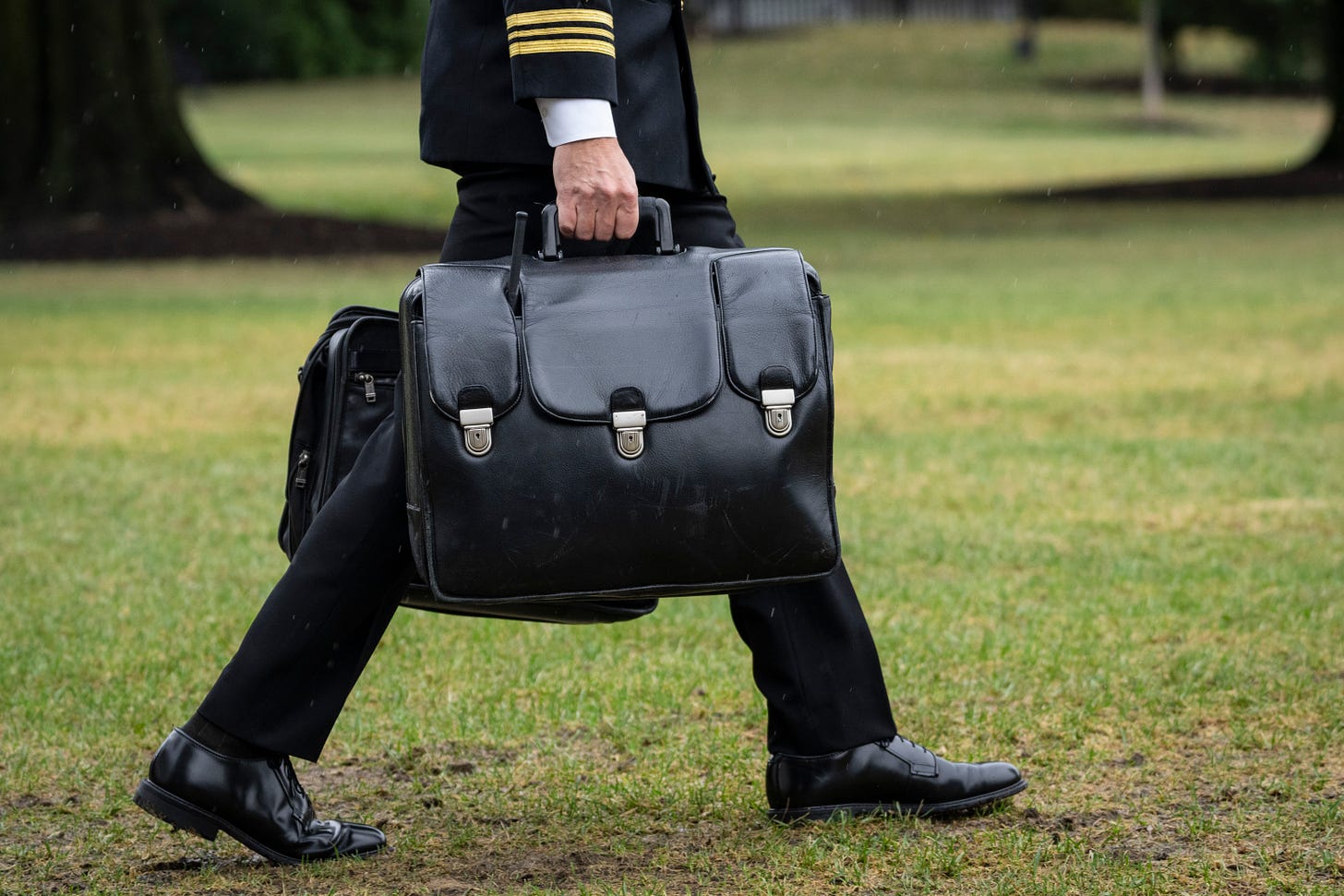
You’ll Miss the Pax Americana When It’s Gone
The post-Cold War international system has its flaws, but the alternative is worse.

WITH DONALD TRUMP ABOUT TO RETURN to the White House, potential dark scenarios for the future of America abound. But the most profound, unfortunately plausible, and darkest scenario could take place at the international level.
For nearly eighty years, and especially the last thirty-five, the global system has been arranged atop the bedrock of American power. The United States is “leader of the free world,” the linchpin of a network of voluntary alliances of democracies, whose combined military might dwarfs the rest.
People born after World War II take this system for granted because they’ve never known anything else, but it’s what keeps (most) aggressive war at bay, facilitating international commerce, and funneling global interactions through institutions such as the United Nations and World Trade Organization. The United States deserves heaps of criticism for its hypocrisies and failures, but it’s also the main reason international law and human rights have some real world influence.
There’s a live risk that the global order is breaking. And while it wouldn’t happen all at once, if it breaks it will not bounce back.
The range of outcomes Donald Trump’s second term could have on the international order is broad. As always, the worst-case scenario is nuclear war, but that remains subject to mutually assured destruction. A less apocalyptic, though more likely scenario of systemic degradation is still alarming.
The theory here is simple: Trump will do what he has repeatedly promised to do and what he started doing in his first term. He will impose widespread tariffs, undercutting the postwar open trade regime, which disincentivizes conflict by promoting economic interdependence. He will break commitments to democratic allies and cozy up to authoritarians. Defenders of the U.S.-led international order from Trump’s first term, such as Secretary of Defense James Mattis and White House Chief of Staff John Kelly won’t be there to slow it down. In their stead will be enablers, including Russia sympathizers. The administration will act without fear of impeachment, legal punishment, or loss of re-election, because Trump already overcame all three.
The earliest big impact will be in Ukraine. Trump’s affinity for Russian leader Vladimir Putin is well known. Trump praised Russia’s full-scale invasion in February 2022 as “savvy” and “genius.” He, Vice President-elect JD Vance, and top surrogate/donor/adviser Elon Musk have all advocated a “peace” plan for Ukraine that amounts to “give Russia what it wants.” From December 2023 to April 2024, congressional Republicans blocked military aid for Ukraine, with Trump’s encouragement. He is likely to reduce if not outright stop U.S. military support for Ukraine, to not agree to the security guarantees Ukraine wants to ensure that Russia doesn’t attack again, and to pressure the Ukrainians to make a deal with—that is, surrender to—Putin.
If U.S. military aid dries up, Europe will have trouble sustaining Ukraine’s war effort. At first they might vow to keep helping Ukraine, even increase support. But they lack industrial capacity. There will simply not be enough anti-air interceptors and artillery shells, and building the capacity would take years. Without the world’s premier power sending aid, European countries will also be more hesitant to give away military equipment, fearing for their own security. The Europeans might make noise for a time, but they’ll eventually fold.
Russian success against Ukraine would undo the post-Cold War precedent affirmed by the 1990–91 Gulf War. In response to Iraq’s unprovoked aggression against Kuwait, a U.S.-led, U.N.-authorized international coalition not only restored Kuwait’s sovereignty but upheld the core principle enshrined in the U.N. Charter that changing borders by force is illegitimate and unacceptable. Western support for Ukraine is upholding the same rule. American timidity in aiding Ukraine has weakened the rule, and America under Trump effectively switching sides will severely undermine it, encouraging would-be aggressors.
NATO is at serious risk, too. Trump denigrated the alliance in his first term, casting it as a protection racket rather than mutually beneficial defense cooperation. NATO members have pledged to spend at least 2 percent of their GDP on their own militaries—not pay the United States—and 23 out of 32 members have met the target. Trump apparently doesn’t care, and campaigned on encouraging Russia to “do whatever the hell they want” to a NATO country that doesn’t pay.
He floated leaving NATO in his first term, but aides reportedly talked him out of it, warning that withdrawal could be a re-election vulnerability. That won’t be a concern now. The president has expansive authority over foreign policy, and breaking alliances won’t require persistence or navigating the federal bureaucracy. Even though the law requires congressional approval for formally withdrawing from the North Atlantic Treaty, Trump could gut it informally by simply withholding support from a threatened ally.
Russia could test America’s commitment to NATO, with actions such as violating a member state’s airspace, conducting covert operations, and eventually undertaking a land grab. The United States will do little to help, and Trump will likely excuse or defend Putin’s actions, as he has before. At some point, a NATO member will say it has been attacked, and the United States might not have its back. That would sap the credibility upon which the alliance relies. While it may persist in name, or form the basis of a future European security force, NATO would be effectively dead. Eastern European states would have to deal with a revanchist Moscow on their own.
Taiwan should be nervous as well, especially since Trump told Chinese leader Xi Jinping in 2019 that the United States would keep quiet as China crushed democracy in Hong Kong. Whether China attacks Taiwan depends on military feasibility and Chinese domestic politics. If aggression comes, it could look more like a blockade than an invasion. But Trump will be less interested in Taiwanese security, and China will likely seek ways to test America’s commitment. With America turned inwards, self-obsessed and hostile to its democratic allies, other Pacific Rim nations may make their own accommodations with Beijing.
America’s alliance with South Korea is also in serious trouble. Trump calls it a rip-off, saying the Koreans should be paying America for protection. And he has repeatedly praised North Korean dictator Kim Jong-un. In his first term, he suspended joint U.S.-ROK military exercises at Kim’s request, part of nuclear negotiations that ultimately yielded nothing for the United States.
Perhaps the biggest risk of Trump’s second term is nuclear proliferation, which was already one of his biggest legacies. In his first term, Trump let Iran out of nuclear restrictions in exchange for nothing, and de-ostracized North Korea when he lied that DPRK was “no longer a nuclear threat.” In his second term, Trump’s actions could severely undermine the nuclear nonproliferation regime. South Korean politicians already talk about going for a bomb if they lose confidence in the American nuclear umbrella. Other countries that feel more vulnerable (Japan, Germany, and Poland) or less restrained (Saudi Arabia), will at least give nuclear weapons greater consideration. Ukrainian President Volodymyr Zelensky has already stated that, if NATO membership is off the table, his country might seek long-term security by developing its own nuclear arsenal.
Meanwhile, the far-right Israeli government led by Benjamin Netanyahu will feel emboldened. It wouldn’t be surprising to see it build settlements in Gaza, and even undo parts of the Oslo Accords by pursuing partial West Bank annexation, all with American acceptance, perhaps even approval.
Trump’s first term approach to Israel-Palestine boiled down to “sure, Bibi, whatever you want.” He moved the U.S. embassy to Jerusalem and recognized Israeli sovereignty over the Golan Heights, breaking with decades-long bipartisan U.S. policy that considered both disputed territory in accordance with international law. During the campaign, Trump criticized Biden for “trying to hold [Netanyahu] back,” and said “he probably should be doing the opposite." The Biden administration has criticized and tried to restrain Israel, albeit not nearly as much as Palestinian supporters would like—but that’s probably over. Critics who denounced Biden’s policy as giving Israel “a blank check” are about to see what one actually looks like.
Foreign governments and their leaders were, like many Americans, happy to consider Trump’s first term an aberration, an electoral fluke, one they could wait out while American institutions limited the damage. Now they know it is not, and will adjust accordingly. Some will try to accommodate Trump’s demands. Some will try accommodating America’s adversaries. Some will act in anticipation, shoring up their security just in case the United States fails to honor past commitments.
There is no undoing damage in history—it is up to those with power and influence to limit it now, and up to future generations to deal with it later.
The post-Cold War international system has serious flaws, but at least there are clear enough rules that charges of hypocrisy mean something. Even rules more honored in the breach will be preferable to the lawlessness Trump’s second term could invite.





